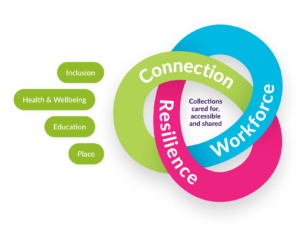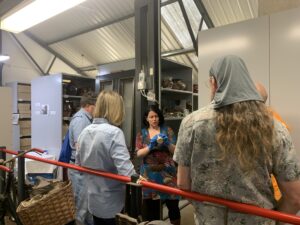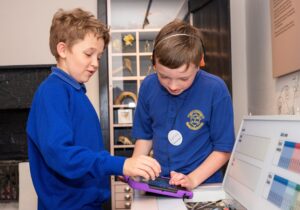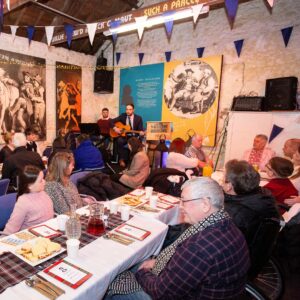- Museums Galleries Scotland
- Strategy Hub
- Connection
Connection
Access to culture is a human right and museums should enable all people to enjoy a cultural life. Museums and galleries can apply this strategy to maximise their positive impact on individuals and communities, building connections which will foster a culture of inclusivity, engagement, and understanding.

- Last updated: March 27th 2024
- Further Strands
- Resilience
- Workforce
Inclusion
Outcome
Museums and galleries across Scotland work with a diverse range of people to support them to tell their stories, creating an environment where all people feel safe, welcome, and engaged.
Sector actions:
- Conduct research to understand the demographics of who is currently accessing museums and to understand under-representation in current users.
- Develop engaging and accessible programming that responds to the needs of all people, prioritising engagement with those who have been excluded from our services and seeking to sensitively co-create opportunities for engagement.
- Embed anti-racist, anti-ableist, and inclusive values within organisational cultures and programming.
MGS actions:
- Develop training to support museums to embrace organisational change to support understanding and practice in key areas, including anti-racism, human rights-based approaches, and participatory practice.
- Share advice on how to seek and share collections knowledge and to work with communities of origin in sharing their histories.
- Support understanding of how museums work in a global context, learning from good practice in understanding and protecting culture and decolonising work in museums.
Resources
Find out more about the Inclusion priority area by reading articles, advice guides, blogs and case studies on the MGS website.
Health & Wellbeing
Outcome
Museums and galleries improve quality of life through programmes which have a positive impact on the physical and mental health and wellbeing of people in Scotland.
Sector actions
- Engage with and co-develop inclusive programmes to support health and wellbeing, including social prescribing, volunteering, and partnering with care providers.
- Use indoor and outdoor spaces to encourage people to lead active lives, to better understand and explore mental and physical health, and to challenge stigma around mental and physical ill health.
- Recognise the negative impact that exclusion, barriers, and cultural erasure can have on people’s wellbeing, and develop programmes to redress this.
MGS actions
- Understand how museums and galleries can have a positive impact on health and well-being by identifying learnings from the Covid-19 pandemic and sharing them with the museum sector.
- Promote and offer training opportunities to support wellbeing within museum programming.
- Enable the museum sector to provide community support by fostering partnerships between museums and health and social care providers.
Resources
Find out more about the Health & Wellbeing priority area by exploring our website.
Education
Outcome
Museums and galleries support Scotland’s educational system and are recognised as key providers of opportunities for wide-ranging lifelong learning.
Sector actions
- Build relationships within learning structures (including after-school groups, schools, colleges, and higher education), working with pupils and educators to co-develop and co-deliver programming and activities.
- Engage and build relationships across disciplinary areas to support learning in STEM/STEAM, literacy, and social studies, helping schools to support pupils to become effective global citizens.
- Support areas of progressive change within the curricula, including anti-racism, attainment, play-based learning, and the professional development of the educational workforce.
- Build relationships with teachers and other learning practitioners, working to support the delivery of the Curriculum for Excellence and its experiences and outcomes for all learners, with emphasis on embedding a decolonised curriculum.
MGS actions
- Support museums to build relationships with the education sector by brokering introductions, advocating for the role museums can play in learning, and connecting efforts at regional and national levels.
- Support the sector to engage with areas of progressive change within the curricula through offering training, case studies, and relationship development with key partners.
- Guide the sector on how to engage with the recommendations from The Race Equality and Anti-Racism in Education Programme, which aims to articulate and embed anti-racism in school life.
Resources
Find out more about the Education priority area by reading articles, advice guides, blogs and case studies on the MGS website.
Place
Outcome
Museums and galleries connect and collaborate to address the needs of their locality with the aim of contributing to Scotland’s thriving cultural life.
Sector Actions
- Enable people across Scotland to celebrate local stories and collections, connect regionally, and understand and share how these connect to national and international contexts including those related to the legacies of empire, colonialism and slavery.
- Engage with place-based initiatives, including in relation to carbon reduction.
- Safeguard, develop, understand, and share objects, crafts, traditions, and cultural spaces that individuals in that locality value and recognise as part of their cultural heritage.
MGS actions
- Connect museums with organisations undertaking collaborative, place-based activity to meet local needs.
- Celebrate successful place-based collaboration in the museum sector, share learnings, and connect place-based work at regional and national level.
- Work with regional and national bodies to understand and safeguard Scotland’s Intangible Cultural Heritage.
Resources
Find out more about the Place priority area by reading articles, advice guides, blogs and case studies on the MGS website.


